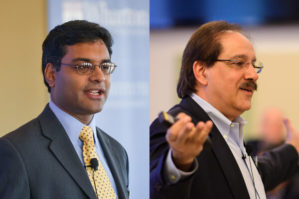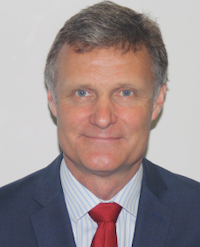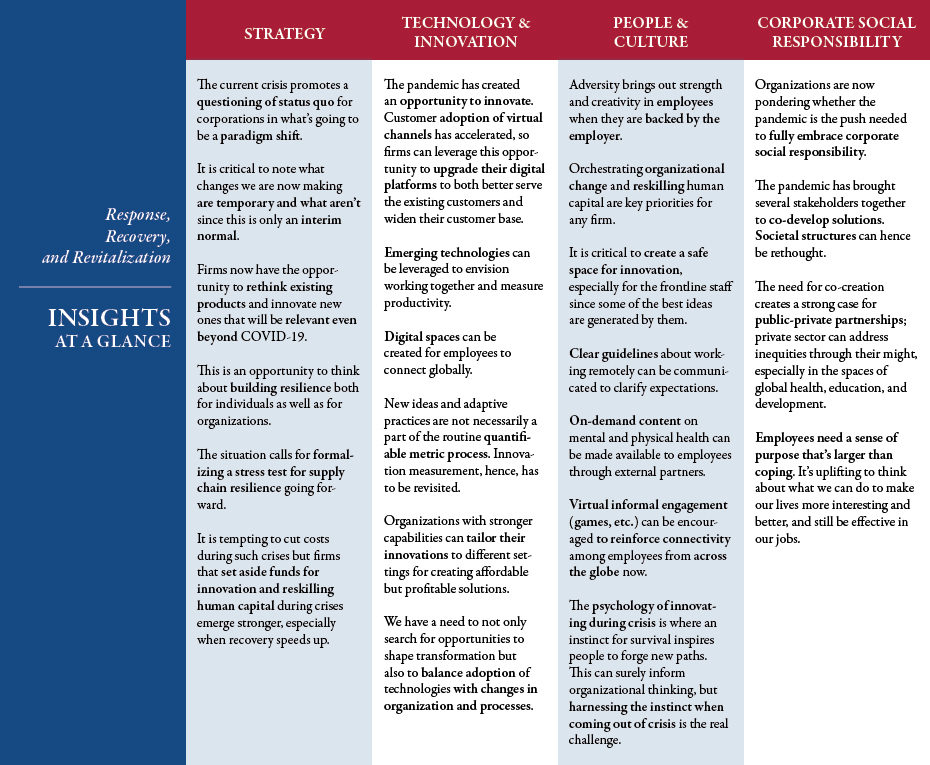“Managing uncertainty always sounds like a negative thing — but without uncertainty there cannot be innovation.” With this, Mack Institute for Innovation Management Executive Director Saikat Chaudhuri offered a productive way for corporations, organizations, and society at large to view the tumultuous business and human impact challenges of the COVID-19 pandemic.
“Right now, yes, there’s an unexpected crisis that is impacting all of our lives,” said Mack Institute Co-director Harbir Singh. “But this is a great opportunity for all of us to think about building resilience, both individuals and businesses. There are new organizational tools being created and innovations that are actually making organizations more effective.”

Chaudhuri and Singh were speaking at the Mack Institute’s Partner Roundtable: Response, Recovery, and Revitalization on August 14, 2020. The Mack Institute is the hub of a global learning network for scholars, business leaders, and students. At the Wharton School, the Institute joins rigorous research with practical applications to help established firms navigate the risks and rewards of innovation. Each year, it hosts several major conferences and workshops; funds student, PhD, and faculty research; and sponsors student initiatives relating to innovation and emerging technologies.
At the Partner Roundtable, Chaudhuri and Singh emphasized the need to search out opportunities and shape positive transformation while balancing the adoption of new technologies with managing organizational and process change.
During the lively two-hour virtual gathering of professionals from Mack Institute’s corporate partners and members of its broader network, participants chimed in from four different continents. The lively discussion covered resilience, the challenges of managing employees who are working remotely, the pandemic’s impact on their industries and supply chains, and their strategic decisions about revenue growth and investment in innovation.
“Industry plays a critical role”
Keynote speaker Vivian Hsu WG’13, deputy director of strategy, planning, and management at the Gates Foundation, kicked off the event by sharing insight into her organization’s partnerships as well as an issue that’s top of mind for everyone: a COVID-19 vaccine. “Much like the Mack Institute brings together different disciplines, for me personally, it has been quite the privilege during this COVID-19 time to be able to work together with epidemiologists, virologists, economists, social workers, education leaders, supply chain experts, digital tool experts — all in the same conversation,” Hsu said.

The Gates Foundation grants around $5 billion annually to support external implementers; investment in the private sector totaled $722 million in 2019. “We are absolutely reliant on our partners in the public sector and private sector to execute strategies,” Hsu said. She urged those gathered at the Partner Roundtable to think about the big picture in this moment. “As leaders in your organizations thinking about innovation, there will be a huge role for the private sector to address inequities starkly highlighted by COVID-19 both during the pandemic and in the recovery process. In the spaces of global health, global development, and U.S. education, industry plays a critical role.”
Though Gates Foundation is best-known for its vaccine work, Hsu said the organization forms partnerships in many sectors, including nutrition, agriculture, digital transformation, financial services inclusion, and connected education. A central goal of the foundation’s private sector investment is ensuring global access to innovative products and services so, Hsu explained, “they are available and accessible at an affordable price to people most in need in low-resource countries. Note I did not say not-for-profit price — I said accessible and affordable price.” She added, “Our strongest partners have found ways to think about how to tailor their innovation and technologies to different settings. We support those efforts.”
Hsu concluded with a forecast for next steps: “The post-pandemic period will look different to our previous normal in 2019. As such, there’s both an opportunity and a need for innovation to support all aspects of society. How do we create greater equity? How do we ensure we are less vulnerable to future outbreaks? How do we recover economically? [These are] all questions that the Gates Foundation is looking to play a role in answering — and partnering with the private sector to drive that work.”
“What are the opportunities?”
After the group reflected on Hsu’s keynote, Chaudhuri kicked off an exchange of ideas by outlining questions and insights that Mack’s corporate partners had pointed to leading up to the event. “In discussions with our partners, we’ve identified four main areas of concern for how we conceive of the situation right now and what is to come: strategy and operations, technology, people, and innovation in a completely virtual world,” Chaudhuri told the group. “We’re currently in an interim normal. What will stay with us permanently and what is temporary? This is relevant to our decision-making.”
One central question that threaded through all areas of concern: With uncertainties as foundational as the amount of office space needed these days, how do companies reprioritize resources when spending both for the short-term and the long-term? The conversation quickly turned to the impact on managing innovation in particular.

Andrew Hall, global client relationship director at Willis Towers Watson, said he believes it’s helpful to think about innovation through short-term and long-term lenses when prioritizing resources. “Identify what you’re doing that will drive an effect in either one or the other, and perhaps one hopefully leads to the other,” Hall said.
Singh shared his perspective from decades of work studying companies working through various crises. “It’s tempting to think about the COVID-19 crisis in terms of cutting costs — let’s become more efficient, let’s be lean,” Singh said. “But companies that set aside money for innovation, money for human capital, during crises emerge stronger, particularly when recovery starts to speed up.”
While acknowledging the uncertainty about the economy and how the financial industry will fare, Salila Pande, president and CEO, State Bank of India (California), spoke about innovation-fueled growth and positive outcomes emerging at SBI California amid the pandemic.
“The branches were serving the customers — and we continued to motivate them, assure them, and enhance their personal protection. They came out with flying colors,” Pande said. “The back office — as you know a lot of fiscal stimulus and loan schemes came out for businesses — was working from home till midnight sometimes. I feel that sometimes this kind of adversity brings out the best among people and we get to see their strength. Then we turn to: What are the opportunities and how can we innovate further?”

Pande noted that the pandemic is accelerating customer adoption of non-branch channels. In fact, SBI is working to upgrade its digital platform for online account opening. “We anticipate that acceptance will be growing and we can reach out to more customers and serve more customers,” she said.
Vibha Jain Miller, vice president, human resources, Graduate Management Admission Council, shared with the group that her organization, best known for its portfolio of business school assessments, stood up online versions of its GMAT and Executive Assessment products when testing centers around the world began to close. GMAC took action to ensure schools and candidates could continue to discover and evaluate each other in a virtual environment. Though the quick pivot was driven by necessity, Miller said GMAC is exploring making online testing more permanent “that’s consistent with the traditional products that we’ve known and administered for over 60 years.”
“A safe space for innovation”
Many roundtable participants echoed the need for cultivating and supporting talent in their organizations at a time when people are adapting to new technology and ways of working.
“To an extent, we are accelerating some of the digital transformations, whether in the banking sector or education, that were inevitable. But while the focus has been on what technology can enable, it’s really about organizational change. There’s the human side, the skilling up that you have to think about as well,” Chaudhuri said. “With employees, there’s the immediate challenge of how do we handle reopening, but there are bigger questions around morale and mental well-being. How do I manage talent? For example, I can’t observe how many hours you spend in the office if you are working remotely. So I need to measure productivity by output. In terms of innovation, there are limitations. There are so many emerging technologies — and we have to use those — but we have to re-envision how we can work together.”

Jeff Blander W’93, who currently serves as chief innovation officer, Office of the Global AIDS Coordinator and Health Diplomacy, U.S. Department of State, emphasized the benefits of creating a safe space to share adaptive practices and innovations.
“There are challenges to routinely nurture innovations in real-time within large and complex organizations, especially when working across multiple stakeholders and countries. However, new ideas, innovations, and adaptive practices are happening frequently. The challenge is how to authentically harness those promising practices, meaningfully and in a timely way. Especially when they might not be fully captured or quantified using standardized reporting processes,” Blander said. He explained that his team hosts discussions regularly to facilitate “South-to-South” learning and sharing of information. “I want to stress the critical importance of those partners and health workers on the frontlines, to have a safe space of dialogue to freely share ideas and how best to solve challenges. Because, the most meaningful and impactful innovations are generated by those working in the field and within the communities they serve.”
According to Miller, her team and GMAC leadership “leaned very heavily into the people consequences of the pandemic and of virtual work.” Leveraging an already well-viewed company intranet and speedily becoming MS Teams experts, they created numerous digital spaces where employees around the world could share professional information as well as personal tips for navigating the world in a pandemic. “It’s energized people. It’s enabled the connections that we expect people to maintain. It’s really nourished our staff as they’ve been dealing with the anxiety,” Miller said. GMAC developed clear guidelines about what’s expected from employees too, allowing for regional customization. They tapped external providers in the health and welfare space to provide on-demand content on mental health, fitness, and meditation. They’ve made time for fun too. “We’ve done virtual games, all over the world,” Miller said. “I competed in checkers with the managing director of one of our London businesses, as well as speed typing. Lost badly on checkers. Won handily on speed typing!”
A post-COVID-19 re-set
A few roundtable participants moved the conversation to looking ahead at recovery. Venkateswara Duggirala, director, consulting and services integration, Tata Consultancy Services, suggested that formalizing a stress test for supply chain resilience going forward would be wise.

“We are seeing that companies had contingency plans that aren’t executable. Companies typically have looked more at the demand side than the supply side. Now in this situation, we have a mismatch between the demand and supply and they are thinking about supply chain resiliency,” Duggirala said. “We need to design more models for the market to test resiliency.” His idea prompted a short debate over whether such a stress test would be mandated, similar to how some countries tightened regulations on big banks after the Great Recession.
Heather Connery, CRB GB chief of staff, Willis Towers Watson, noted that she is considering how her work on the psychology of innovating during crisis — where an instinct for survival inspires people to forge new paths — can inform organizational thinking. “Once you’re starting to come out of survival instinct and crisis,” she said, “how do you start harnessing that? Also, is there anything that could have been done to make that happen, to facilitate that innovation [prior to a crisis].”
Sanjeev Sachdeva, CTO of life sciences, Tata Consultancy Services, agreed that the current crisis promotes a questioning of the status quo, both for corporations and society at large. “This is an opportunity to bring in new models,” Sachdeva said. He cited Thomas Kuhn’s paradigm shift concept, which deals with advances in science coming about as traditional frameworks became irrelevant. Chaudhuri noted that, just as Hsu raised the notion of rethinking societal structures entirely, many organizations are pondering whether the pandemic is the push needed to fully embrace corporate social responsibility.
“Corporations also have an opportunity at the moment to recognize what many forgot, that managing talent really matters,” Singh said. “Organizations must realize that employees need a sense of purpose. The chief engineer of the iPhone virtual keyboard once told me that people worked 15-16 hours a day — because it was a project that was truly transformational. You have to have a sense of purpose that’s larger than coping. I think it’s uplifting to think about what we can do to make our lives more interesting and better and still be effective in our jobs. It’s exhausting to just be efficient. That’s not how you innovate.”
In addition to serving as an opportunity for Mack Institute for Innovation Management partners to connect, exchange ideas, and collaborate, the Partner Roundtable: Response, Recovery, and Revitalization in August 2020 will help to set the agenda of Mack’s 2020 Fall Conference. Details of the virtual event will be announced soon.



